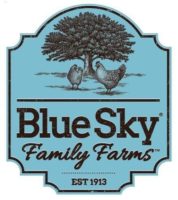Blue Sky Family Farms Pastured Organic (Egg Innovations)

| Rating |     |
| Farm/Brand Headquarters | Port Washington, WI |
| Website | https://blueskyfamilyfarms.com/ |
| Market Area | WI, OH, IL |
| Total Score | 1210 |
Family owned and operated, Egg Innovations is headquartered in Port Washington, Wisconsin and originates Free Range and Pasture Raised organic, non-GMO and conventionally fed eggs under the Blue Sky Family Farms brand. They can be found in finer natural and grocery stores throughout the Midwest and Northeast. Our eggs are raised by family farmers on farms across WI, OH, IN and KY. Every detail matters in producing consistently great eggs, that’s why we provide all of our partner farmers with barn plans, animal husbandry training, birds, feed, and support. Certified Humane by third parties, our birds really are free to roam inside and out, enjoying green grass, sunshine and fresh air as good weather permits.
You can find these eggs in different groceries (possibly including Walmart).
| Criteria | Points | Comment |
|---|---|---|
| TOTAL (possible score is 1700) | 1210 | 4-egg     |
|
Brands that have close daily control over their egg production receive the most points. Ownership Structure | 75 | Multiple farms supply this brand, which is family owned and operated |
|
Brands that only produce organic products make the biggest investments — in time and money — in systems that benefit us all. Eggs sourced from a single operation receive the most points. Eggs of unclear origins and/or with poor oversight receives the fewest points. Commitment to Organic Label | 80 | Brands markets primarily organic eggs, but produces both organic & conventional eggs, but the sources only supply either conventional or organic eggs |
|
Additional certifications, depending on the credibility of the label, can demonstrate a commitment beyond the organic standards. Other Labels and Standards | 60 | American Humane Certified (AHC); Non-GMO Project Verified, CA SEFS Compliant, Certified by Humane Farm Animal Care (HFAC) (free range), United Egg Producers (UEP), Whole Foods Market verified |
|
Smaller flock sizes (the number of laying hens per housing structure) offer better animal welfare conditions. Flock Size(s) | 45 | The majority of suppliers have flock sizes less than 20k birds, with a small number of farms with over 20k birds |
|
The best housing offers space for natural behaviors and legitimate access to the outdoors through adequate exits. Hen Housing and Exit Areas | 60 | Fixed housing barns; a small number of suppliers use aviary barns; large number of popholes that are big enough to encourage hens exiting (both sides of barn) |
|
Adequate indoor spacing reduces stress and disease. With less crowding, birds can stretch their wings and more easily perform other natural behaviors. Indoor Spacing | 20 | 1.2 square feet allotted per hen |
|
High scoring brands provide enough space to allow each hen to fully utilize their outdoor area, and to perform instinctive behaviors without harming the environment. Outdoor Spacing | 100 | 108 square feet brand standard per hen (total over lifetime as layer) |
|
High quality outdoor access includes vegetation, soil, and ample opportunities to forage year-round. Quality of Outdoor Access | 60 | Outdoor area is not rotated; brand standard is to maintain 90% vegetation, including shrubs and trees |
|
Birds that are introduced to the outdoors early are more accustomed to spending time outdoors without fear or stress. Outdoor Access Timing | 60 | Typical age is 18 weeks |
|
Year-round access to perches, scratching areas, deep litter, novel foodstuffs, and dust bathing contribute to quality of life. Enrichments | 90 | Enrichments provided indoors and outdoors |
|
Chickens use their beaks to interact with the world. Authentic organic farmers account for this behavior, eschewing beak trimming. Alterations | 70 | Hens are beak-tipped; induced molting is not allowed |
|
Raising chicks on farm or buying them from certified organic hatcheries shows dedication to organic production from start to finish. Chicks and Pullets | 75 | Brand supplies organic pullets to it's contractors, which are organic prior to the second day of life |
|
Brands that have low rates of deaths and utilize their spent hens for human consumption or similar score the highest. Deaths, Culls, and Spent Hens | 90 | Death rate below 5%; spent hens are sold live for food |
|
Brands that closely monitor and manage health of soil, native species, and water quality receive the most points. Environmental Impacts | 75 | Has brand standard for pasture management (trimming weeds, maintaining a stable height of vegetation, avoiding overgrazing, no tillage in the pasture area, no synthetic applications); manure is sold or composted |
| Feed Sourcing | 75 | Owns feed mill with locally sourced feed; purity of grain is determined at the mill before it is received |
|
Brands that score well here go above and beyond to ensure the highest animal welfare, taking into consideration their hens’ safety and cleanliness, natural behavior, and stress levels. Animal Welfare | 75 | Good animal welfare benchmark |
|
Cornucopia believes you have a right to transparency. Top brands share information with Cornucopia via a survey and cooperate with our own independent investigations. Transparency | 100 | Full and open transparency |
| Soy free and/or gluten free? (non-scoring) | Layers are fed gluten and soy, but this brand does carry other eggs that are soy-free | |
|
Brands do not receive points, but are invited to submit the name of their Accredited Organic Certifier (suppliers may have different certifiers). Organic Certifier (non-scoring) | QCS (Quality Certification Services) and OnMark Certification Services | |
|
Extra credit is offered for various practices that go above-and-beyond in some form. Extra Credit | 0 | None |

